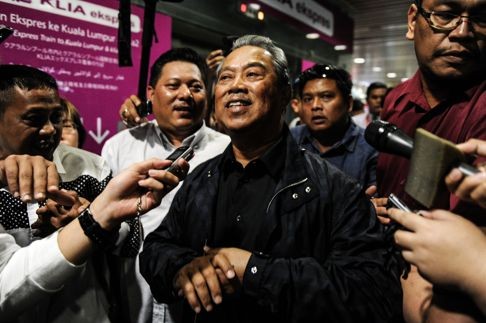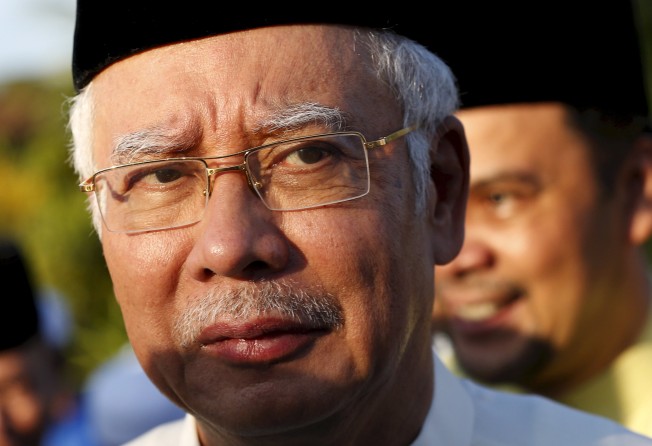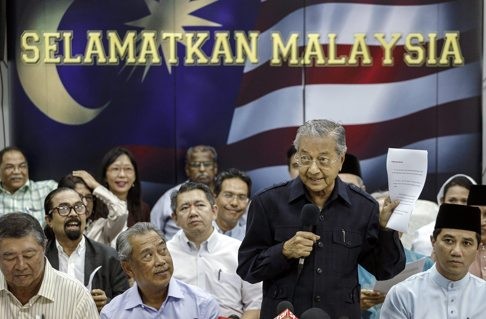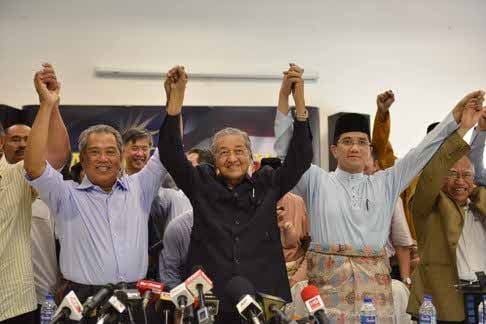
As the war cries for his ouster grow, can Malaysia’s Prime Minister Najib Razak hold on till the next election?
Yang Razali Kassim says former PM Mahathir’s emergence from retirement to consolidate the disparate forces calling for Najib to step down will be a test of survival for him and Umno

The unthinkable is happening in Malaysian politics. It has been triggered by the deepest political crisis the country has known, with Prime Minister Najib Razak at the centre. Bonded by a common desire to unseat Najib, two bitter foes – former premier Mahathir Mohamad and his jailed former deputy Anwar Ibrahim – have joined hands in a turn of events long thought impossible.
By mobilising a group of “concerned citizens” of various political stripes to “save Malaysia”, Mahathir has once again thrust himself into the eye of the storm. With Anwar in jail, many of the disparate forces that have aligned themselves against Najib over the 1MDB scandal are finally finding someone to rally around in a marriage of convenience. It is ironic that the man who crushed the opposition while in power has remade himself in retirement as the de facto leader of what in essence is a citizens’ revolt.
Mahathir himself described this as a “very strange group of people” brought together by a common goal to see Najib step down. By calling it a “core group”, Mahathir indicates this is only the beginning. What could emerge is still hazy, perhaps even to Mahathir himself. But it is safe to say that a new era in Malaysian politics is unfolding, with the key players jostling for a place.

The Mahathir-Anwar tag team aside, the convergence of forces pushing for systemic reform is equally unprecedented
The second group is basically the rest – the anti-Najib forces comprising some 50 of the country’s political luminaries and other leading personalities, including Mahathir’s wife Dr Siti Hasmah Mohamad Ali and Democratic Action Party leader Lim Kit Siang, as well as civil society leaders.
The Mahathir-Anwar tag team aside, the convergence of forces pushing for systemic reform is equally unprecedented. Indeed, Anwar’s embrace of his foe’s mission signals that Mahathir has reciprocated – in his support of Anwar’s reform agenda – perhaps convinced that the entire system has been compromised by Najib’s survival manoeuvres.
This is reflected in the concluding paragraph of the declaration “to pave the way for much needed democratic and institutional reforms” and to “restore the important principle of the separation of powers among the executive, legislature and judiciary”, which will “ensure the independence, credibility, professionalism and integrity of our national institutions”.

Najib has brushed it aside as a “very big mistake” while the government says the only lawful mechanism to change the prime minister or government is through elections. Umno Youth, the party’s youth wing, has even challenged the Mahathir-led movement to turn itself into a formal coalition and challenge the Umno-led National Front in a general election.

Although the National Front coalition won control of Parliament in the last general election in 2013, it actually lost the popular vote. Gerrymandering helped keep it in power. Given Najib’s current scandals, which have dealt substantial damage to Umno’s image, elections, if held today, could conceivably lead to its defeat. Mahathir’s son, Mukhriz, the deposed chief minister of Kedah, said as much when he declared that “the opposition could easily win the next general election”. As of now, the opposition forces have thrown their support behind Mahathir’s movement because they share the urgent need to save the country by replacing the scandal-hit prime minister before more damage is done.
Mahathir’s “core group” could be variously described as having features of a civil disobedience campaign, a people’s power movement, even a de facto “new opposition”. Prior to its launch, there had been talk of other similar moves, such as former law minister Zaid Ibrahim’s initiative for a March 27 closed-door gathering of like-minded groups. There is also the move by Dr Wan Azizah Ismail, Parti Keadilan Rakyat’s leader and Anwar’s wife, to convene national consensus talks.

But if Mahathir and his citizens’ movement could sustain themselves and grow, and if the opposition could overcome its disunity in the run-up to the next general election, which must be held by August 2018, Umno and the National Front could be in deep trouble. If this citizens’ movement keeps up its pressure on the government, it could trigger a nationwide anti-Najib groundswell.
If this citizens’ movement keeps up its pressure on the government, it could trigger a nationwide anti-Najib groundswell
Two trajectories may then follow: the downfall of Umno and the ruling coalition at the next election, or a move by Umno to pre-empt impending electoral defeat with a leadership change.
If the second trajectory holds, Umno, for its own survival, may be forced to vote Najib out, or craft unconventional strategies – such as allowing him to step down voluntarily. Face-saving compromises and “out of the box” solutions should not be ruled out, given that a new threshold has been crossed and circumstances are veering towards potential instability – with wide-ranging repercussions for Southeast Asia.
Yang Razali Kassim is a senior fellow with the S. Rajaratnam School of International Studies, Nanyang Technological University, Singapore. This first appeared in RSIS Commentary